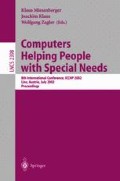Abstract
The number of visually handicapped students who study at universities and other organizations for post secondary education is increasing gradually. The situation of higher education for the visually impaired is rapidly changing and different countries answer this situation in different ways. In this research, we started to compare the educational systems and the service provision systems for blind and visually handicapped students in post-secondary education in Japan and European countries, mainly Austria. The goal of these studies is to outline proposals for the improvement of the higher education for the target group.
Access this chapter
Tax calculation will be finalised at checkout
Purchases are for personal use only
References
Cabinaet Office Government of Japan: Shogaisha Hakusho/White Paper on Handicapped People, (2001) (in Japanese)
Hideji Nagaoka, Nobuyuki Ohtake, Hiroshi Katoh, Yasusige Yonezawa: Investigation of teaching computer skills to the blind, Tsukuba College of Technology Techno Report, vol. 8, No. 2, 77–81, (2001) (in Japanese, except abstract)
Klaus, J.: Studium fuer Sehgeschaedigte in Informatik und Wirtschaftsingenieurwesen: Abschlussbericht des Modellversuchs Informatik fuer Blinde, herausgegeben von: Bundesministerium fuer Bildung, Wissenschaft, Forschung und Technologie, Bonn (1995)
Miesenberger, K.: Von partiellen Modellprojekten zu interuniversitaeren Netzwerken: Integration sehbehinderter und blinder Studierender in universitaere Studiengaenge. In: Horvorka, H., Sigot, M. (Hg.): Integration(spaedagogik) am Pruef-stand-Menschen mit Behinderungen ausserhalb von Schule, Studienverlag, Innsbruck (2000), S. 375–396
Wetzl, G.; Fuchs, I.: Studierende mit Behinderungen und Chronischen Krankheiten an Oesterreichs Universitaeten; Eine Analyse der Studien-und Lebenssituation, Salzburg (1995, BMWF)
Author information
Authors and Affiliations
Editor information
Editors and Affiliations
Rights and permissions
Copyright information
© 2002 Springer-Verlag Berlin Heidelberg
About this paper
Cite this paper
Katoh, H., Pauly, M., Hara, S., Nagaoka, H., Miesenberger, K. (2002). Learning from Each Other: Comparing the Service Provision for Blind and Visually-Impaired Students in Post-secondary Education in Japan and Europe. In: Miesenberger, K., Klaus, J., Zagler, W. (eds) Computers Helping People with Special Needs. ICCHP 2002. Lecture Notes in Computer Science, vol 2398. Springer, Berlin, Heidelberg. https://doi.org/10.1007/3-540-45491-8_148
Download citation
DOI: https://doi.org/10.1007/3-540-45491-8_148
Published:
Publisher Name: Springer, Berlin, Heidelberg
Print ISBN: 978-3-540-43904-2
Online ISBN: 978-3-540-45491-5
eBook Packages: Springer Book Archive

